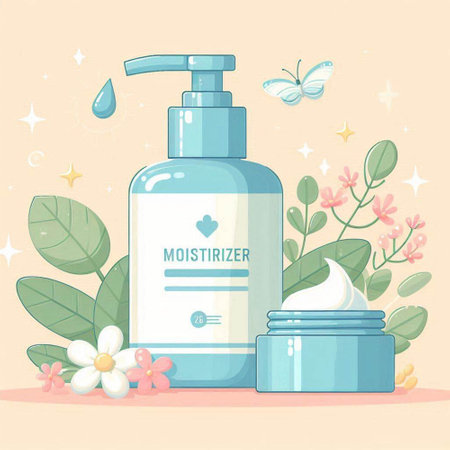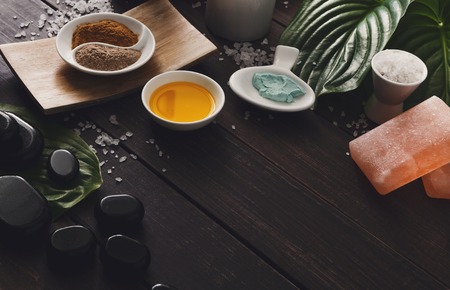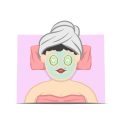Understanding Dandruff according to Ayurveda
Dandruff and itchy scalp are common concerns across India, often aggravated by our unique climate and lifestyle. According to Ayurveda, these scalp issues are not merely superficial, but are deeply rooted in the imbalances of the body’s three doshas: Vata, Pitta, and Kapha. Each individual has a unique combination of these doshas, and any disturbance can manifest as health issues—including dandruff.
The Dosha Connection
Ayurveda views dandruff as a sign of imbalance primarily between Vata and Kapha doshas. Vata imbalance leads to dryness and flakiness, while excess Kapha brings about oiliness and sticky flakes on the scalp. Sometimes, aggravated Pitta may also cause scalp irritation, redness, or itching due to its heating properties.
Vata Dosha Imbalance
When Vata is disturbed—often due to excessive exposure to dry weather, irregular routines, or stress—it causes dryness of the scalp. This results in flaky, powdery dandruff that can be quite itchy.
Kapha Dosha Imbalance
Excess Kapha, which may result from oily diets, lack of cleansing, or humid environments (common in many Indian cities), leads to greasy dandruff. The scalp appears sticky with clumped white or yellowish flakes.
Pitta Dosha Involvement
Though less frequent, Pitta imbalance—often triggered by spicy foods, hot climates, or emotional stress—can inflame the scalp. This manifests as redness, burning sensation, and sometimes pustules along with dandruff.
Holistic Approach
Ayurvedic solutions for dandruff go beyond treating symptoms; they aim to restore doshic harmony through lifestyle adjustments, dietary changes, and natural remedies. Understanding your own dosha type is key to selecting the best herbs and oils for long-lasting relief from dandruff and an itchy scalp.
Common Ayurvedic Herbs for Scalp Health
Ayurveda, the ancient Indian system of medicine, has long relied on the healing properties of native herbs to manage scalp concerns such as dandruff and itchiness. These botanicals are not only time-tested but also widely integrated into Indian hair care routines today. Below, we explore some of the most esteemed Ayurvedic herbs—Neem, Amla, Bhringraj, and Fenugreek (Methi)—that are valued for promoting scalp health and offering natural relief from dandruff.
Key Herbs and Their Benefits
| Herb | Traditional Use | Key Benefits for Scalp |
|---|---|---|
| Neem (Azadirachta indica) | Widely used in Indian households for its antibacterial and antifungal properties | Helps reduce dandruff-causing microbes, soothes itching, cleanses scalp |
| Amla (Indian Gooseberry) | An essential ingredient in hair oils and powders across India | Rich in Vitamin C; strengthens hair roots, reduces flakiness, supports overall scalp health |
| Bhringraj (Eclipta alba) | Popular in traditional hair oils for enhancing hair growth and vitality | Relieves scalp irritation, nourishes follicles, prevents dryness that can trigger dandruff |
| Fenugreek (Methi) | A staple in Indian kitchens and home remedies for hair care | Moisturizes dry scalp, reduces flakes, calms inflammation, adds shine to hair |
Cultural Relevance and Practical Application
These herbs are more than just remedies—they are woven into the daily lives of many Indians. For instance, neem leaves are often boiled in water for a final rinse after shampooing; amla powder is mixed with curd or oil as a nourishing mask; bhringraj oil massages are a common Sunday ritual; while fenugreek seeds soaked overnight are ground into a paste for scalp application. The use of these herbs is deeply rooted in Indian tradition, passed down through generations for their proven effectiveness in maintaining a healthy, dandruff-free scalp.

3. Power of Ayurvedic Oils
Ayurvedic oils have long held a sacred place in Indian hair care traditions, offering holistic solutions for dandruff and itchy scalp issues. These oils not only nourish the scalp but also balance the doshas, addressing the root cause of many hair problems as per Ayurveda. Incorporating regular scalp massage—known locally as abhyanga—with these oils into your daily routine can make a remarkable difference in scalp health and hair vitality.
Coconut Oil: The Timeless Remedy
Coconut oil, or Nariyal Tel, is a staple in every Indian household. Revered for its natural antifungal and moisturizing properties, coconut oil helps combat dryness and flakiness that often lead to dandruff. When gently massaged into the scalp, it penetrates deeply to soothe irritation and support healthy hair growth. Its cooling nature makes it ideal for those with aggravated pitta dosha, calming inflammation and itching.
Sesame Oil: The Warming Healer
Known as Til Tel, sesame oil is another powerhouse in Ayurvedic hair care. Rich in antioxidants and nutrients, it works wonders for nourishing the scalp and strengthening hair roots. Sesame oil’s warming effect is particularly beneficial for balancing vata dosha, which can manifest as dry, itchy scalp conditions. Regular abhyanga with sesame oil improves blood circulation, promotes relaxation, and supports the natural detoxification of the scalp.
Herbal Infusions: Neem Oil & Bhringraj Oil
The use of herbal-infused oils like neem oil (Nimba Tel) and bhringraj oil (Keshraj Tel) is deeply rooted in traditional Indian remedies. Neem oil is celebrated for its potent antibacterial and antifungal qualities—making it highly effective against dandruff caused by microbial imbalances. Bhringraj oil is hailed as the “King of Herbs” for hair due to its ability to rejuvenate hair follicles, reduce scalp inflammation, and encourage new hair growth. Together, these herbal infusions provide comprehensive relief from itchiness while supporting overall scalp health.
Integrating Abhyanga into Your Routine
For best results, warm your chosen oil slightly before applying it to the scalp. Using gentle circular motions, massage the oil into the roots with your fingertips—a practice that not only nourishes but also enhances relaxation and stress relief after a long day. Leave the oil on for at least 30 minutes (or overnight for deeper conditioning) before washing off with a mild herbal shampoo. This simple daily or weekly ritual honours the wisdom of Ayurveda while providing tangible benefits for dandruff-prone scalps.
4. Home-Based Ayurvedic Remedies
Indian households have long relied on time-tested Ayurvedic remedies for scalp health, using locally available herbs and oils to effectively manage dandruff and itching. Here, we share practical home treatments and traditional rituals that are easy to prepare and incorporate into your weekly hair care routine.
Classic Hair Masks for Dandruff Relief
Ayurveda recommends natural ingredients like neem, fenugreek (methi), curd (dahi), and coconut oil for their antifungal, cooling, and moisturizing properties. Below is a step-by-step guide to preparing some of the most trusted Indian hair masks:
| Remedy | Ingredients | How To Prepare & Use |
|---|---|---|
| Neem & Curd Mask | 10 neem leaves, 2 tbsp curd | Grind neem leaves into a paste, mix with curd. Apply to scalp for 30 minutes before washing with lukewarm water. |
| Methi & Coconut Oil Paste | 2 tbsp methi seeds, 3 tbsp coconut oil | Soak methi seeds overnight; grind into paste. Warm coconut oil, mix with methi paste, apply to scalp for 20-30 minutes, then rinse off. |
| Amla & Yogurt Pack | 2 tbsp amla powder or fresh amla pulp, 2 tbsp yogurt | Combine ingredients into a smooth paste. Massage onto scalp, leave for 25 minutes, wash with mild shampoo. |
Traditional Herbal Rinses
Herbal rinses are widely practiced in Indian homes as a post-shampoo ritual to soothe the scalp and control flakes. Two popular options include:
- Bhringraj Decoction: Boil a handful of bhringraj leaves in water for 10 minutes, strain and cool. Use this as a final rinse after shampooing.
- Lemon Water Rinse: Squeeze half a lemon into a mug of water. Pour over scalp after washing hair to reduce itchiness and balance pH.
Step-by-Step: Applying an Ayurvedic Scalp Oil Treatment
- Warm 3–4 tablespoons of pure coconut or sesame oil (add a few drops of tea tree or neem oil for enhanced effect).
- Part your hair and gently massage the warm oil into your scalp using circular motions.
- Wrap your head in a hot towel for 15–20 minutes to aid absorption.
- Shampoo thoroughly with a mild herbal cleanser.
Cultural Tip:
The “champi” or head massage is more than just relaxation—it improves blood circulation, supports scalp health, and is an essential part of many Indian families’ Sunday routines.
5. Dietary and Lifestyle Recommendations
The Role of Balanced Diet in Scalp Health
According to Ayurveda, a healthy scalp begins with proper nutrition. Consuming a balanced diet rich in fresh fruits, leafy vegetables, whole grains like brown rice or millets, and protein sources such as dal and paneer helps maintain the equilibrium of doshas—Vata, Pitta, and Kapha—that influence hair and scalp health. Avoiding excessively spicy, oily, or processed foods is recommended, as these can aggravate Pitta dosha and trigger dandruff or itching. Including anti-inflammatory spices like turmeric (haldi), cumin (jeera), and coriander (dhaniya) in daily meals further supports scalp wellness.
Hydration: Essential for Scalp Moisture
Staying well-hydrated is crucial for preventing dryness and flakiness on the scalp. Ayurveda suggests drinking warm water throughout the day to enhance digestion and toxin elimination. Herbal teas made from tulsi (holy basil), ginger, or fennel seeds are preferred alternatives to sugary beverages. Coconut water and buttermilk (chaas) are also traditional Indian drinks that promote internal cooling and hydration, both vital for a healthy scalp environment.
Yoga and Pranayama for Stress Relief
Mental stress is a common trigger for scalp problems such as dandruff and itchiness. Incorporating yoga asanas like Adho Mukha Svanasana (Downward Dog), Sarvangasana (Shoulder Stand), and Balasana (Child’s Pose) improves blood circulation to the scalp and reduces tension. Pranayama practices—including Anulom Vilom (alternate nostril breathing) and Kapalbhati—help balance the mind, regulate hormones, and support detoxification processes that benefit skin and scalp health. Practicing these routines regularly can be transformative in maintaining a clear, comfortable scalp.
Ayurvedic Daily Routine (Dinacharya)
Establishing a consistent daily regimen that includes waking up early, oiling the scalp with medicated oils like bhringraj or coconut before bathing, gentle head massages, and mindful eating habits aligns with Ayurvedic wisdom. This holistic approach not only targets current scalp issues but also prevents future imbalances by fostering harmony between body, mind, and environment.
Key Takeaway
A harmonious blend of wholesome diet, sufficient hydration, regular yoga or pranayama, and adherence to Ayurvedic lifestyle practices forms the foundation of long-term relief from dandruff and itchy scalp. These recommendations not only address external symptoms but also nurture overall well-being according to time-honoured Indian traditions.
6. Precautions and When to See a Doctor
While Ayurvedic remedies using herbs and oils such as neem, coconut oil, amla, and tea tree oil are widely trusted in India for managing dandruff and itchy scalp, it is essential to exercise certain precautions. Not every scalp condition responds well to home remedies; sometimes, medical intervention may be required.
Recognising When Home Remedies May Not Be Enough
If you notice that your dandruff or scalp itchiness persists despite regular use of Ayurvedic treatments for more than two weeks, or if the symptoms worsen, it is advisable to consult a qualified dermatologist or trichologist. Severe flaking, redness, swelling, oozing, or pain could indicate an underlying condition such as seborrheic dermatitis, psoriasis, eczema, or a fungal infection that requires prescription medications.
Potential Allergic Reactions
Even natural ingredients can cause allergic reactions in some individuals. Common signs include increased itching, burning sensation, rashes, or hives after applying any herbal paste or oil. Always perform a patch test before using a new product extensively on your scalp. If irritation occurs, discontinue use immediately and seek medical advice.
Cultural and Practical Considerations
In the Indian context, it is customary to use home-based treatments passed down through generations. However, certain traditional mixtures may not suit everyone’s scalp type—especially if you have sensitive skin or known allergies. Additionally, overuse of heavy oils like mustard or castor oil without thorough cleansing can sometimes aggravate dandruff instead of relieving it.
When to Consult a Healthcare Professional
You should see a doctor if:
- Dandruff is accompanied by hair loss or bald patches
- The scalp shows signs of infection (pus, severe redness)
- You experience fever or malaise alongside scalp symptoms
- There is no improvement after trying multiple remedies
Indian healthcare practitioners can offer tailored advice—combining modern dermatological solutions with safe Ayurvedic practices to ensure effective relief while respecting cultural preferences.
Final Guidance
Ayurvedic herbs and oils provide valuable support for mild dandruff and itchy scalp relief but always use them mindfully. Stay informed about your own skin’s reactions and never hesitate to seek professional help when home remedies are insufficient or complications arise.


